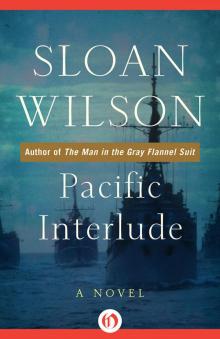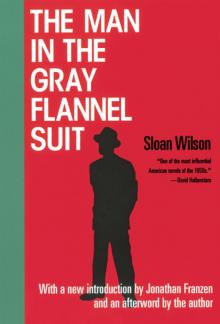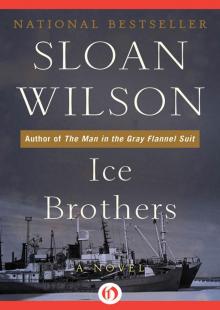- Home
- Sloan Wilson
A Summer Place Page 30
A Summer Place Read online
Page 30
“I came to talk to you about something,” John said.
“Why do you have a gun?”
“I’m afraid of the dog.”
“Are you all right? Is something wrong?”
“Everything’s fine. Let’s get some coffee and we can talk.”
“All right,” Bart said, and lit an oil lantern.
“What happened to the electricity?” John asked.
“That bastard Hasper—we had a fight. So he cut me off.”
“A fight?”
“Crazy son-of-a-bitch,” Bart said. “He won’t keep the dog chained any more, even though he killed all the goddamn sheep and goats he was supposed to protect. I’m going to get rid of him.” He lit another lantern.
“Does the dog attack you?”
“I never go out of the house any more anyway. Except in summer.”
“How do you get your food?”
“Got whole supply in the cellar. Had Andrews bring it over. I’m completely self-sufficient here.”
John went to the kitchen to brew coffee. The sight of his father with the old uniform and thin gray beard had shocked him, and his hand shook when he put the pot on the stove.
“You look cold,” Bart said. “Don’t you want a real drink?”
“No, thanks.”
“You’re wise. Stay off it as long as you can.” Bart got a bottle from a cupboard, poured himself a quarter tumblerful of whisky, and took a swallow. He shuddered, and then lit a cigarette. “What did you come here for?” he asked.
John sat down across the kitchen table from him. “Father, I’m in love,” he said.
Barton gave a short high laugh. “At your age, that’s not surprising. Who is it, the little Jorgenson girl?”
“Yes.”
“Well, congratulations,” Barton said, not unkindly. “She’s a pretty little thing.”
“I want to get married.”
“Now?”
“Now,” John said.
“You’re too young. It’s absurd. Marriage at eighteen!”
“I still want to get married.”
Bart glanced at him sharply. “Are you in trouble?”
“No. Or yes. I just want to get married and I need help.”
“Oh, no!” Bart groaned. “Not so young!”
“We’re going to be all right,” John said evenly. “I would like to get married and come here.”
“Oh, Lord!” Bart groaned.
“I want to borrow money. Some day I’ll repay it.”
“Jesus Christ!” Bart said in despair.
“Maybe I can still go to college,” John said. “But right now we want to come here.”
With a shaking hand Bart lifted his glass to his lips.
“You once said you had some money in a trust fund,” John continued. “I need maybe three hundred dollars now to get married and come back here.”
Bart got up and began pacing up and down the floor. “It’s not a question of money,” he said.
“What else?”
“You don’t see it the way I do,” Bart replied, continuing to pace and to drink. “My God. You sit there, a boy eighteen years old, and I stand here, forty-one years old, and we see two entirely different things.”
“What do you see?”
“First let’s get to what you see. You see a pretty girl. You see that it’s wonderful to be in love. You don’t feel any shame, John, even though you’ve done a terrible thing to a nice youngster. All you see is love and the pretty girl, and that’s not enough.”
“I think I see more than that,” John said.
“You see responsibility—you’re good that way, better than I. But that’s not enough.”
“What else is there?”
“I’ll tell you what I see,” Barton said, his voice rising. “I’ll tell you the truth, John. It’s painful, but we better have it out.”
“What truth?”
“Let’s start with me. It concerns you. I’m not much of a father, John—I’ve never been. There are all kinds of things wrong with me that you’re getting old enough to think about, because they affect you, because they’re part of my poor inheritance and yours. I said we see things differently, and we do. I see things straight.”
He paused and took another drink, spilling a few drops on the floor.
“What?”
“I’m going to say it, John. It’s tough, but sometimes the truth has to be said. I’m a little crazy, Johnny—everybody knows that. But it’s like the joke, where the man says, ‘I may be crazy, but I’m not stupid.’ That’s true of me.”
“What has that got to do with us?”
“I’ll tell you,” Barton said. “Let’s face it.” He paused in his pacing and confronted John squarely, pointing his finger at his face. “You’re the son of an alcoholic, Johnny. You’re the grandson of a suicide, well covered up. You didn’t know that, did you? You’ve got a real bad inheritance, and at eighteen you’ve made a girl pregnant. Don’t you see what it is, Johnny? No romance. It’s a damn sordid piece of business, and we’re all trapped in it, and we can’t get out.”
“That has nothing to do with this.”
“It doesn’t? Me and Sylvia, your rotten mother! Sleeping with the tutor when she was younger than you. You’re getting old enough to understand, Johnny. No more secrets. The cat’s out of the bag—all the cats, the terrible, mangy, howling obscene cats of inheritance. You’ve got to see them. They’ll kill you if you leave them in the dark!”
“I don’t see how they apply to me.” John spoke mechanically. He was standing now, very erect, with his back against the window.
“You’re one of them, Johnny. A mangy cat, one of us. Me the alcoholic. Your mother a good deal worse, and now you, Johnny, eighteen with a pregnant girl. You see what I see, Johnny? It’s enough to make me cry!”
“Molly isn’t like that.”
“All you see is a pretty girl!”
“My Molly—she isn’t like that.”
“Don’t be sentimental!” Barton shot out. “You’re old enough to face facts. You’re not going to get married, you’re going to repair yourself.”
“No.”
“I’ll pay for a psychiatrist, not a minister!”
“I’m going to get married.”
“I’ll tell you what will happen if you do. You’ll bring one more miserable child into the world, one more alcoholic, one more seducer of the young!”
“No!”
“I’ve got a good mind, John, in spite of the liquor, and I’m going to insist on an intelligent solution.”
“What?”
“With my mother’s trust fund, I’ll give you money for an abortion.” Barton’s face became contorted. “Abortion isn’t always a bad thing,” he said. “I wish my mother had been aborted before I was born.”
“Molly!” John said.
“I won’t help you get married!”
“Molly!” John repeated.
“You’ve got to see reason! You can’t help being corrupt, but you don’t have to be stupid! If you marry you’ll get divorced before you’re twenty-one!”
“Molly!” John said. “She’s…”
“You’re as bad as your mother!”
“Molly,” John said. “She’s not the way you say. Maybe I am. I don’t know. But my Molly, she’s not an alley cat. I don’t know. You say just a pretty girl, but it’s more. It’s more! I say this, goddamn you bastard father, goddamn your great intelligent mind, in spite of everything you say, it’s more!”
Turning, he fled the house.
Chapter Thirty-Two
OUTSIDE THE DOOR of the garage apartment, John grabbed his gun and his lantern, and started to run back to the wharf. Halfway down the hill he paused in confusion. Where was he going? He had almost no money left. What was he going to do? Hitchhike back to Molly, and get her from the school—certainly he couldn’t leave her alone there. But where would they go? I’
ll get a job, he thought; maybe I can get a job playing the piano, or at least as a laborer. But it would take time to do that, and meanwhile he needed money, enough to support them for a few days at least, until they could get married. Money—it seemed to him that everything depended upon getting that, or something to sell. Standing there in the darkness with the wind whistling in his ears, he suddenly had an idea, and ran back up the hill, not to the garage, but to the old inn itself. His mind was working fast and clearly now. All the doors and windows would be locked of course. No, there was a French door leading to the veranda. Hurrying to it, he found that it had been covered by a heavy wooden storm door, but there was a window nearby with the glass exposed. Without hesitation, he broke one pane with the stock of the shotgun, reached in and tried to open the latch. It was so rusty and covered with old paint that it would not budge. Standing back impatiently, he seized the gun by the barrel and wielded it like a club, smashing all the panes and the window frame. Climbing gingerly through, he let himself down to the floor inside, and held the lantern high. In its feeble light the living room of the old inn looked like a monstrous cavern. The piano, where he had sat playing as a boy, was covered with a torn sheet. It was cold, and the broken glass he had scattered over the floor glittered like ice. Moving quickly without any attempt to be quiet, John went to the basement. It was damp there, and there was the patter of rats’ feet ahead of him. Opening the door of a storage room, he found some old suitcases, covered with the tattered remains of labels of European resorts his parents and grandparents had long ago visited. The leather was speckled with green mold, but some of the bags were still serviceable. Choosing one of medium size, John went back to the living room and started rifling through the drawers of the old cherry highboy. There he found the leather box containing the ivory chess set his grandfather had brought home from India, and the French clock, lying carefully packed in newspapers. Ripping the sheet from the piano, he swathed the clock and its glass dome in it, and packed it with the chess set in the suitcase. Next he went to the closet off the pantry where the ornate silver his grandmother had received as a wedding present was stored in a heavy teak chest. The top tray held rolls of musty velvet with pockets in which teaspoons were kept. He packed all he thought he could carry in the suitcase, closed it and shoved it through the broken window. Without a backward glance he climbed after it, scratching his wrist slightly on a jagged piece of glass. Awkwardly carrying the gun and the lantern in one hand and the heavy bag in the other, he hurried down the hill to the wharf. Todd Hasper’s dog was still snarling in the distance, and the wind seemed to be blowing harder.
At the end of the wharf he paused, fearful of stumbling in the dark and falling through the rotten wood. It would not help Molly now if I broke my leg or killed myself, he thought, visualizing the inky waters swirling beneath. Heavy clouds scudded over the sky, covering the moon and stars. Nothing could be seen outside the small circle of lamplight, and the end of the wharf was invisible in the midst of the rushing tide. John put down his burdens and rested before continuing.
“Hello there!” he shouted as the dim shape of the schooner along the end of the wharf loomed ahead.
“Hello!” Herb Andrews answered. “What have you got there?”
“Some things of mine. Watch out, they’re heavy!”
John helped Herb to cast off the lines and they returned to Harvesport. He slept aboard the schooner that night. In the morning he washed his face in a bucket of cold water, changed his clothes, and carrying the heavy suitcase, went ashore to catch a bus back to Boston.
In Scollay Square he toured the shops, carrying only one object at a time to reduce the suspicion that he was a thief. This time he felt no anger when low prices were quoted; in fact, he felt no emotion at all. The world had blurred, as in a dream; his senses had been deadened. The honking of traffic, the garish signs advertising tattoo parlors, bars and dance halls, the swirling crowd of sailors on the streets, the opaque faces of the men behind the counters of the secondhand stores, all these seemed to merge into a pattern of confusion too fantastic to matter. The well-remembered curlicues on the handles of his grandmother’s teaspoons lost their familiarity on the shop counters. Passing a store window, he saw a dim reflection of himself, a wavering figure carrying a French clock wrapped in a sheet, like a baby in swaddling clothes, a shadow without substance, and he had the curious sensation of being unsure whether he were alive or dead.
A jeweler gave him a good price for the clock. Altogether, he was able to raise almost four hundred dollars on the contents of the suitcase. On the way to the bus station, he passed a secondhand car lot which displayed an ancient Plymouth selling for ninety-nine dollars. Thinking of all the traveling he had ahead of him, John bought the car. It was important, he thought, to start saving every penny from the beginning. Not only would the car get him to Virginia, and wherever they were going afterward almost as cheaply as a bus, but it could even be a place for them to sleep, if necessary. A man with a car could not be said to be entirely homeless.
On the way to Briarwood, John picked up every hitchhiker, until the car was full. At one time he was carrying a soldier on leave from Texas, or perhaps absent without leave, John thought; the father of a family of six out on the road in search of work; a merchant marine sailor going to see his girl in Georgia; and a small man who sat absolutely still, hour after hour, without giving any information about himself at all, but who occasionally smiled for his own mysterious reasons.
It was Sunday when John got to Briarwood, and a tea for the young girls and their callers was being held in the common room of the school. Several girls who had had permission to be away for the weekend had just returned, and were saying goodbye to their escorts. The common room was a gay and busy place.
Molly met him there at five in the afternoon, still pale, but with no sign of defeat in her face or bearing. They sat with their heads bent close over a cup of tea while youngsters laughed all around them. Briefly he told her what had happened.
“What are we going to do?” she asked. “Go to Richmond, or some place, and get married. After that…”
“What?”
“I’ve got enough money to last a long while,” he said. “We’ll have plenty of time to think.”
“I won’t be so afraid when we’re married,” she said.
“Can you think of an excuse to get away from school? I don’t want them to call the police.”
“Miss Summerfield is awfully hard to fool.”
“I guess we better just go then,” John said, and stood up. Molly was afraid someone would stop her if she got her suitcase, so without delay they walked out of the common room, and looking as casual as possible, climbed into his car.
The old engine started without hesitation, and he drew away from the curb. While in the town he drove slowly to avoid drawing attention, but when they got on the open highway he bore down on the accelerator, anxious to leave Briarwood behind. For five minutes they drove without talking. He had thought he would be happy as soon as he was alone with her, but the silence between them was leaden. He wanted to ask if she was happy, but the question would have sounded ironic. On Molly’s pale face there was determination and courage, but not joy.
“A small town might be better,” he said abruptly.
“What?”
“It might be easier to get married in a small town than in Richmond.”
“All right.”
Molly, he wanted to say, oh, Molly, what’s happening to us? Running away to get married ought to be romantic or something, it ought not be like this.
“I love you,” he said suddenly. “I love you, Molly.”
“Oh, Johnny!”
“What’s the matter?”
“What are we going to do?”
“Get married, of course!”
“I mean afterward.”
“I’ll get a job. There are all kinds of things I can do.”
There was a short silence before
she said, “We’ve been kidding ourselves, Johnny.”
“What are you talking about?”
“I don’t think anyone will even marry us. We’re too young.”
“We can say we’re older.”
“They’ll know.”
“They can’t stop us!” he said defiantly, and drove a little faster.
But Molly’s prediction proved accurate. When they entered the dingy brick building which served as the town hall of Rocksford, a small city twenty miles from Briarwood, and said they wanted a marriage license, a thin, baldheaded clerk in a sweat-stained shirt looked at them expressionlessly and said, “How old are you?”
“Twenty-one,” John said hastily, not knowing the legal age for marriage, but guessing it must be that. “We’re both twenty-one.”
“Do you have your birth certificates?” the clerk asked, and perhaps Molly imagined that there was contempt on his face. On a bench at the side of the room a newspaper rustled, and she saw a half dozen men who were loafing there staring at them.
“No,” John said. “We’ll have to send for them.”
“Come back when you have them,” the clerk said, and abruptly turned his back to them, as though the very sight of their faces embarrassed him. A tall man in faded overalls who was sitting on the end of the bench spat into a spittoon.
Molly put her hand on John’s arm when they walked out and had difficulty restraining an impulse to run.
“We can go to another state,” John said as they got back in the car. “I’m sure there are places where we can get married.”
“Yes,” she said, trying to forget the faces of the men on the bench who had stared at her. The wedding guests, she thought, trying to fight off hysteria, recalling the man who had spat, with the brown teeth and stubbly beard, and the fat, dough-faced derelict beside him with the watery eyes.
John started the car. Outside of the town the road ran uphill, and the old car groaned as John shifted first into second gear, and then into third. The motor knocked alarmingly.

 A Summer Place
A Summer Place Pacific Interlude
Pacific Interlude Man in the Gray Flannel Suit
Man in the Gray Flannel Suit Ice Brothers
Ice Brothers